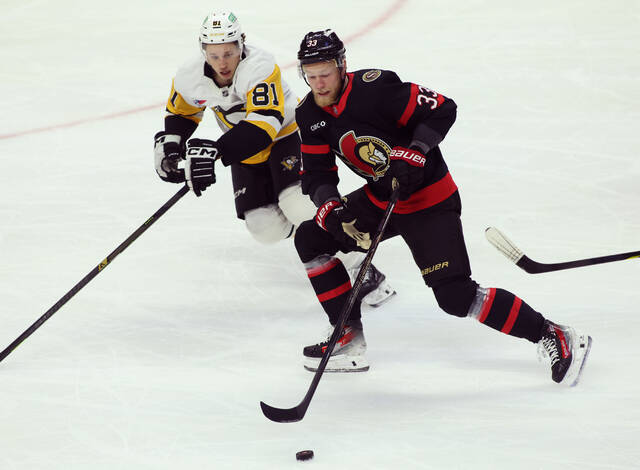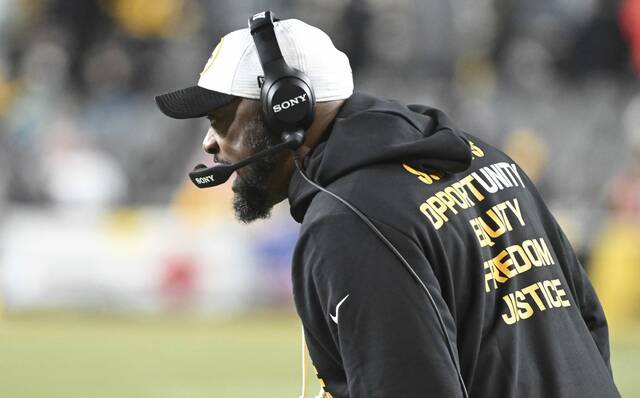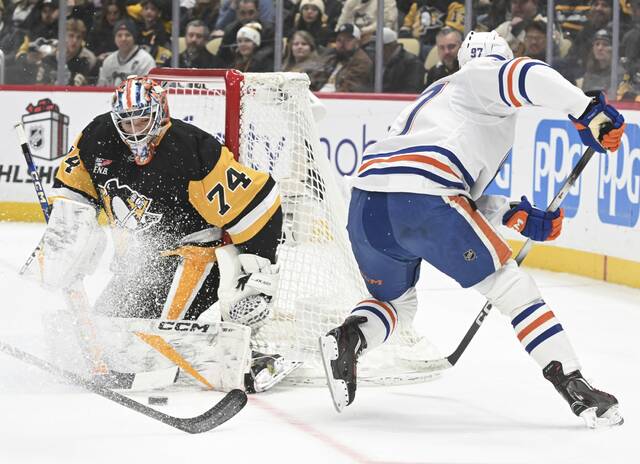During the Pittsburgh Penguins’ brutal 6-1 loss to the New Jersey Devils on Thursday at PPG Paints Arena, none of the 20 players the home team put on the ice could boast of a good performance. After all, they allowed the equivalent of a touchdown.
One player in particular, yielded the equivalent of a 2-point conversion.
A pair of Devils goals came from an unlikely source in Penguins defenseman Marcus Pettersson. The typically reliable Pettersson surrendered two turnovers in his own zone that resulted in nearly immediate scores for the Devils.
The first came at 6 minutes, 44 seconds of the first period. Playing a puck out of his own right corner, Pettersson slipped to the ice and allowed the puck to slide to the right point for Devils defenseman P.K. Subban. From there, Subban fed a pass to the right of the net for Devils forward Yegor Sharangovich, who roofed a wrister to give his team a 3-0 lead.
If the Penguins were entertaining any thoughts of a comeback, they were snuffed out midway through the second period when the Devils scored their fourth goal at the 9:24 mark.
Retrieving a puck on his own end boards, Pettersson failed to detect Devils forward Jack Hughes pursuing him from the right of the net. As a result, Hughes picked Pettersson’s pocket, then fed a slick backhand pass to the left of the net for Devils forward Dawson Mercer who fired a quick wrister.
It was a rare sight seeing Pettersson struggle with puck management.
It was even rarer seeing the typically stoic Swede express emotion as he broke his stick off the post immediately after Mercer scored.
After that, Pettersson — who also was out of position on a two-on-one rush that led to a Devils goal 1:16 into regulation — did not record another shift in the second period and only four during the third period. In total, Pettersson clocked 8:54 of ice time on 13 shifts, his second-lowest figure of the season.
His lowest came during a 3-2 home win against the Florida Panthers on Nov. 11. He was limited to 4:05 of ice time on seven shifts after suffering an injured during the first period.
Penguins coach Mike Sullivan was slow to single out any player after the loss. After all, just about everyone “contributed” to the outcome.
“We’ve got to make better decisions,” Sullivan said when asked about defensive-zone turnovers. “We simply have to make better decisions. When we do, we don’t put our team in those circumstances.”
Since then, Pettersson has rebounded and logged two of his highest ice time totals of the season. During a 1-0 home win against the New York Rangers on Saturday, Pettersson clocked 18:04 of time on ice with 25 shifts. Less than 24 hours later in a 3-2 road win against the Columbus Blue Jackets, Pettersson came in at 18:49 on 23 shifts.
Being able to shake off a bad moment (or in Thursday’s case, a bad game) is something Pettersson claims he is better suited to do than he was in earlier junctures in his career.
“I don’t think I had a very good game,” the 25-year-old Pettersson said of the loss to the Devils. “Nobody did, but me in particular, I wasn’t happy at all with that game. I’ve come a long way. Just grown. If something like that happened even last year or my first couple of years in the league, I would have kind of got down on myself and be hard on myself. I want to be hard on myself, but I’ve got to let it go at some point.”
Figuring out that balance can be a hard lesson for any player.
“An important part of being a good pro is having the ability to shake off a shift or game when it doesn’t go your way,” Sullivan said. “All of these players, they’re the best players in the world. That’s why they’re in this league. It’s a very competitive league. And they’re human beings. So when things don’t go their way, that has an effect on people. One of the things that we talk a lot about a group is just that resilience of being observant of each experience so that we can improve and get better. But we can’t be overly critical of ourselves where we’re so hard on ourselves that we become our own biggest opponent.
“Experience and maturity helps with that because you go through life experience, both on the ice and off the ice. Those life experiences usually harden you to some of those challenges. But these guys are human beings like anyone else. And they have emotions. That’s part of being a good pro, I think, is just the ability to shake those situations off and being able to move by it so that you can optimize your potential.”
Pettersson appeared to move past that dreadful performance against the Devils, at least based on the steady performances he has offered in the two games since.
“I felt the next game, our whole team responded,” Pettersson said. “I think I responded the way I wanted to. That just gives you confidence right back, to answer back and let it go. You can’t really change what happens. Just answer back and I think I’ve done that.”








